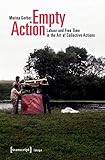Empty Action : Labour and Free Time in the Art of Collective Actions / Marina Gerber.
Material type: TextSeries: Image ; 124Publisher: Bielefeld : transcript Verlag, [2018]Copyright date: 2018Description: 1 online resource (236 p.)Content type:
TextSeries: Image ; 124Publisher: Bielefeld : transcript Verlag, [2018]Copyright date: 2018Description: 1 online resource (236 p.)Content type: - 9783839440902
- Art, Modern -- 20th century
- Art History of the 20th Century
- Art
- Cultural History
- Fine Arts
- Free Time
- Labour and Work
- Media Aesthetics
- Music
- Performance Art
- Political Art
- Russia
- Slavic Studies
- ART / History / Contemporary (1945-)
- Art History of the 20th Century
- Art
- Cultural History
- Fine Arts
- Free Time
- Labour and Work
- Media Aesthetics
- Music
- Performance Art
- Political Art
- Russia
- Slavic Studies
- 709.04 23/eng/20230216
- online - DeGruyter
| Item type | Current library | Call number | URL | Status | Notes | Barcode | |
|---|---|---|---|---|---|---|---|
 eBook
eBook
|
Biblioteca "Angelicum" Pont. Univ. S.Tommaso d'Aquino Nuvola online | online - DeGruyter (Browse shelf(Opens below)) | Online access | Not for loan (Accesso limitato) | Accesso per gli utenti autorizzati / Access for authorized users | (dgr)9783839440902 |
Frontmatter -- Contents -- Acknowledgements -- Introduction -- Interlude: A Participant’s Report on the Action SUMMA (2015) -- 1. Empty Action -- 2. Collective Actions’ Concept of Art -- 3. Free Time in Trips out of Town -- 4. Free Time, Labour and Art: A Theoretical Contextualisation -- 5. Collective Actions Members ‘at Work’ and ‘after Work’ -- 6. The Production of (Collective) Actions -- 7. Empty Action as the Suspension of Work -- Bibliography -- List of Illustrations
restricted access online access with authorization star
http://purl.org/coar/access_right/c_16ec
Collective Actions is one of the most significant artistic practices to emerge from Moscow Conceptualism. The group's enigmatic idea of 'Empty action' is the focal point for Marina Gerber's exploration of this practice in relation to labour in the late Soviet Union. Based on interviews with members of the group (Monastyrski, Panitkov, Alexeev, Makarevich, Elagina, Romashko, Hänsgen and Kiesewalter) she exposes the relation between their jobs, their individual art practices and their contribution to the collective in the context of post-Stalinist debates on labour and free time. Departing from the mundane fact that Collective Actions' practice took place in free time from work for the Soviet State, Gerber identifies Empty action as a form of 'art after work'.
funded by Deutsche Forschungsgemeinschaft (DFG)
Mode of access: Internet via World Wide Web.
In English.
Description based on online resource; title from PDF title page (publisher's Web site, viewed 26. Aug 2024)


